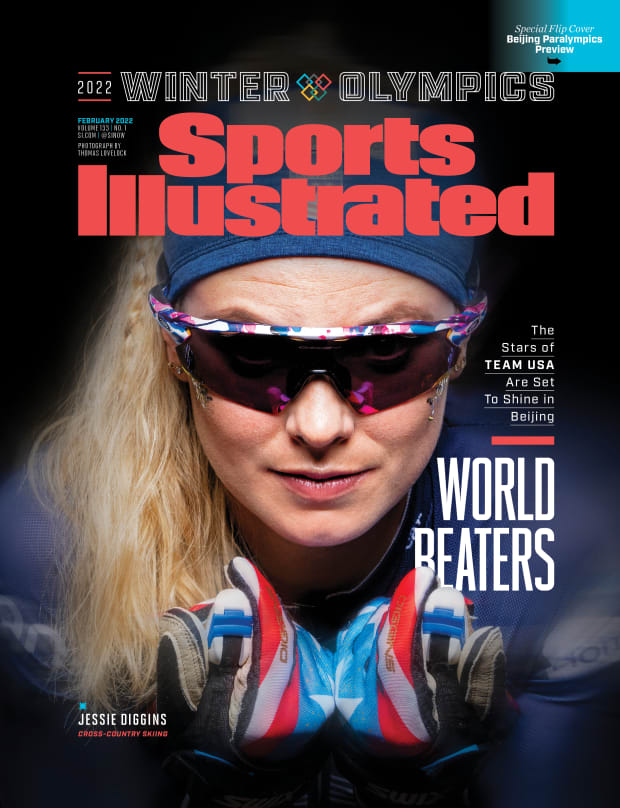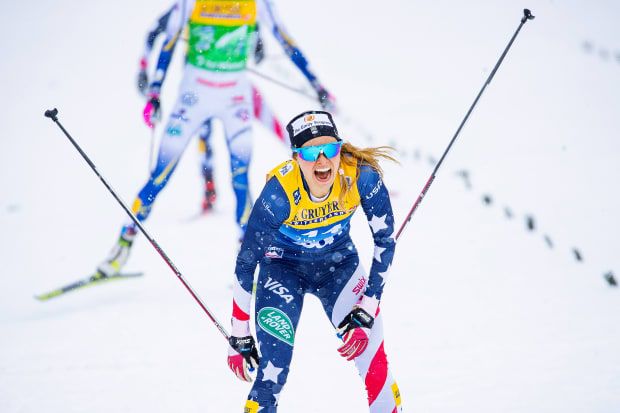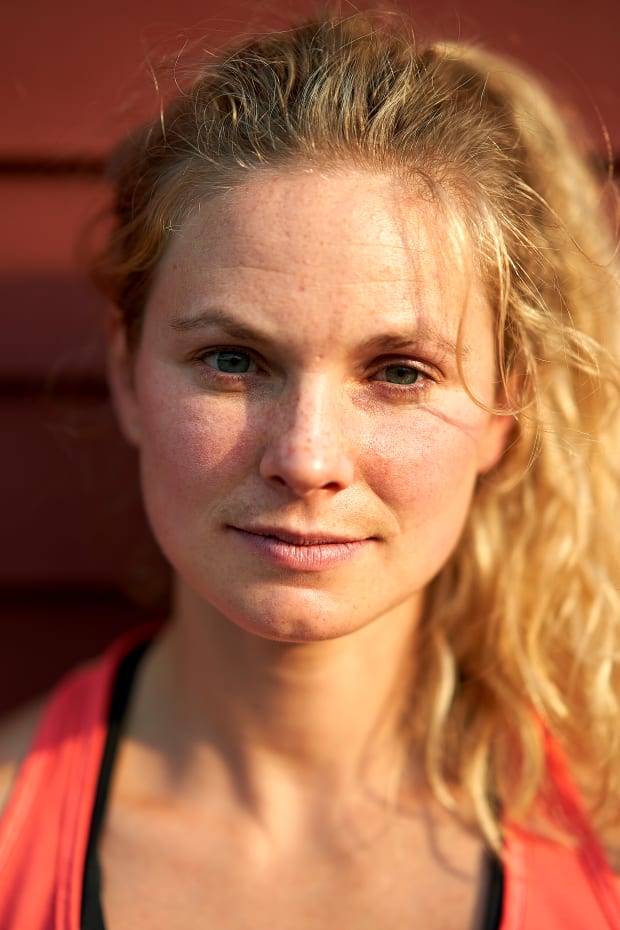The last few seconds are brutal. They are supposed to be. No matter how much or how hard Jessie Diggins trains, she never expects to feel good when she pushes toward her absolute limit at the end of a race. Sometimes she squeezes so much out of her body that her vision tints—“everything starts to look a little bit pink or yellow, even though I’m not wearing colored glasses”—and sometimes her legs feel numb. By the time she crosses the finish line, she says, “I’m definitely, like, close to blacking out.”
That feeling explains, as much as anything, why Diggins made history in PyeongChang with her thrilling, come-from-behind photo finish, winning (with now retired Kikkan Randall) the team sprint freestyle race to earn the U.S.’s first gold medal in women’s cross-country skiing since the Winter Games started in 1924. It explains why she can win more medals in Beijing. It even explains why she will be O.K. if she doesn’t medal at all.
“You just go as hard as you can,” Diggins says. “And then you never have to ask yourself: What if I just tried? What if I’d committed? What if I had been willing to be the person who gives the most? I would love to be the person who wins. But the only thing I have control over is [being] the person who gives the most.”
She adds, “I haven’t looked at my Olympic medal in a long time. It lives in my parents’ basement.” What she sees, instead, are the ripple effects from winning.

Thomas Lovelock/Sports Illustrated
Order the February 2022 Winter Olympics Preview issue here
She has seen kids pretending they were her, lunging at the finish line of an imaginary race to edge an opponent. Like many U.S. Olympians, she relishes seeing Americans start to love her sport as much as she does. She also says winning “definitely has changed the amount that I feel I’m able to give back, because it gives you this amazing platform.” She is on the board of Protect Our Winters, a Boulder, Colo.–based organization that pushes for legislation to combat climate change. She is a spokesperson for the Emily Program, which helps people treat eating disorders like the one Diggins had as a teenager growing up in Afton, Minn.
If she had only pursued gold, she would have all she wanted, and she might feel empty. But she can always keep pursuing that feeling.
When Diggins won with Randall in 2018—and joined 1976 Winter Olympics silver medalist Bill Koch as the only Americans to make the podium in the sport—she did so because she was so committed to the pain. She did not pass Sweden’s Stina Nilsson until the final meter of the race, on the last of the six total laps split between the two teammates on the five-mile course. After extending the tip of her ski across the finish line, she was so exhausted that she couldn’t process the history she had made, by a mere 0.19 seconds.

Federico Modica/NordicFocus/Getty Images
“In the moment, to be honest, I wasn’t even thinking about the fact that we’d won the Olympics,” Diggins says. “It was just this race—like any race, you know, you just try to race as well as you can. And I was full of the adrenaline and the emotion and the moment of executing a good race.”
When she lifted herself out of the snow and turned around, she saw coaches on their knees. Her U.S. teammates were crying. Diggins thinks of cross-country skiing as a team sport even when she is competing in an individual race, and that helps her stay motivated, too. She pursues that feeling because she is competing for everybody else.
Diggins is 30 in a sport where elite athletes can contend for a long time. She says, “I don’t feel like I’m at my peak,” but she defines peak differently than you might think. She doesn’t mean she will win more gold medals or race faster. She means she can get better in small ways: technique, tactics, consistency.

“I really have tried to reframe pressure as this amazing privilege to be in this point of my career where I’m looking for those tiny, tiny improvements and getting excited,” Diggins says. “There’s always going to be something for me to improve on. I’m never going to be bored. And that’s so cool.”
That’s not to say her hard work hasn’t paid off—particularly this season. In January 2021, Diggins captured the most prestigious individual title of her career, becoming the first American to win the multistage Tour de Ski. Last March she made history again as the first U.S. woman and just the second American to capture the overall FIS Cross-Country Ski World Cup title. Entering her third Olympics, she’s poised to lead a young U.S. team in Beijing.
Diggins has not yet made a final decision on how many of the six possible events (individual sprint, team sprint, pursuit, individual start, mass start and the relay) she will race in China, but she is aiming to match her full slate from PyeongChang, where she finished seventh or better in all six. Once she arrives, Diggins will evaluate her form and consider the conditions—she embraces frigid weather, but says, “if it’s super, super cold, that’s a huge energy drain on the body”—before solidifying her schedule. What she does know is how she will race. She cannot control what other skiers do or the weather or where she finishes, but she can control how hard she goes. She acknowledges that after winning Olympic gold, “the pressure is different, for sure.” But she has a plan for dealing with that.

Erick W. Rasco/Sports Illustrated
“I have not set outcome goals for the Olympics,” Diggins says. “However, there are a lot of process goals. It’s this theme of trying really hard not to get stuck on the results.”
Diggins was ready in 2018—not just for the last few meters of that team sprint, or to win Olympic gold, but for everything that followed. The same approach that put her atop the podium helped her when she stepped off it.
“You don’t get a free pass for life because you won the Olympics,” Diggins says. “You have to work every single day to be a good person, and a good teammate. And so in that way, it hasn’t changed my life at all.”







